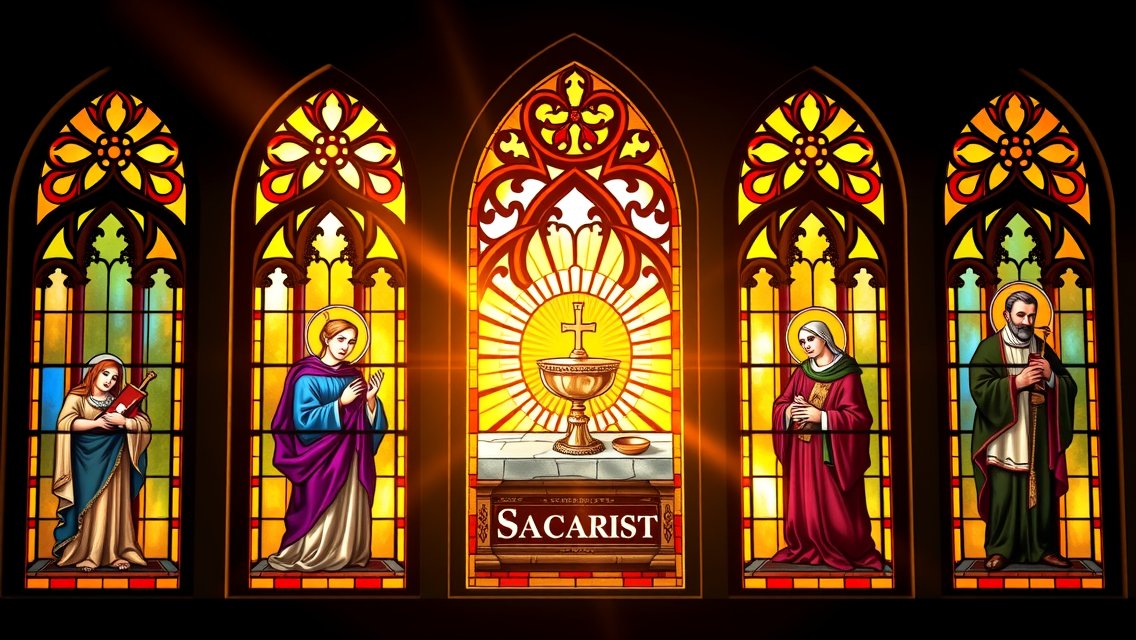The 7 Sacraments
1) Baptism
2) Confirmation
3) Eucharist
4) Penance
5) Anointing of the sick
6) Holy Orders
7) Matrimony
“Christ instituted the sacraments of the new law… The seven sacraments touch all stages and all
the important moments of Christian life: they give birth and increase, healing and mission to the
Christian’s life of faith. There is thus a certain resemblance between the stages of natural life and
the stages of the spiritual life.
What is a sacrament?
A sacrament is an outward sign instituted by Christ to give special grace. It may also be called a
sacred and mysterious sign and ceremony ordained by Christ to convey grace to our souls.
The Sacraments may be compared to channels which convey water from a fountain-head, and the
soul to a vessel which one carries to these channels to be filled. The Passion of Christ is the rich
and exhaustless source from which the grace of every Sacrament is derived; for each grace was
purchased for us at the price of our Divine Redeemer’s Blood.
The Church has never instituted, and could not institute, any Sacrament – this is a power
reserved to God Himself.
GRACE FROM THE SACRAMENTS
Sacraments give two kinds of grace: Sanctifying grace (the grace which confers on our souls a
sharing in the life of God Himself) and sacramental grace (special grace that helps us to carry out
the particular purpose of the sacrament).
Sacrament Particular Sacramental Grace
1. Baptism: Helps us to live as children of God, makes it easier for us to believe in
God and to act accordingly, and lessens our inclinations to evil.
2. Confirmation: Gives us strength to profess our faith even under difficulties and
persecutions and to give good example to others.
3. Eucharist: Nourishes our love of God and one another and helps to overcome our
natural self-love, or selfishness.
4. Penance: Helps to cure the deeper inclinations to evil that actual sins have put in
our soul and makes it easier for us to keep out of sin in the future.
5. Anointing: of the sick Helps us to accept sickness as a purifying cross sent by God and even to
accept death willingly from His hands whenever He chooses to send it.
6. Holy Orders: Helps a priest to fulfill his sacred duties and to be a good priest.
7. Matrimony: Helps married people to bear which each other’s defects and to fulfill
the duties of their state, chiefly bringing children into the world and
rearing them for God.
CLASSIFICATIONS OF THE SACRAMENTS
Sacraments of Christian initiation: Baptism, Confirmation and Eucharist are called sacraments
of Christian initiation, because they lay the foundations of every Christian life.
Sacraments of healing: Penance and Anointing of the Sick are called sacraments of healing. The
Lord Jesus Christ, physician of our souls and bodies, who forgave the sins of the paralytic and
restored him to bodily health, has willed that his Church continue…His work of healing and
salvation, even among her own members.
Sacraments at the service of communion: Holy Orders and Matrimony are directed toward the
salvation of others; if they contribute as well to personal salvation it is through service to others
that they do so. They confer a particular mission in the Church and serve to build up the People
of God.
Sacraments of the living: Confirmation, Eucharist, Anointing of the sick, Holy Orders and
Matrimony are called sacraments of the living because their chief purpose is to give more grace to
souls already spiritually alive through sanctifying grace.
Sacraments of the dead: Baptism and Penance are called sacraments of the dead because their
chief purpose is to give the supernatural life of sanctifying grace to souls spiritually dead through
sin.
OTHER THINGS TO THINK ABOUT
Reception of one of the sacraments of the living while in the state of mortal sin is a mortal sin of
sacrilege, because one is treating a sacred thing with grave irreverence.
Baptism, Confirmation and Holy Orders can be received only once because they imprint on the
soul a spiritual mark, called a character, which lasts forever. This imprint comes from the Holy
Spirit and is the seal of the Lord (“Dominicus character”) “for the day of redemption.”
“Sacrament of sacraments” – The Eucharist occupies a unique place as the “Sacrament of
sacraments”, since “all the other sacraments are ordered to it as to their end.”
Source: Catechism of the Catholic Church, Libreria Editrice Vaticana, 1994, pp. 311, 357, 383.

